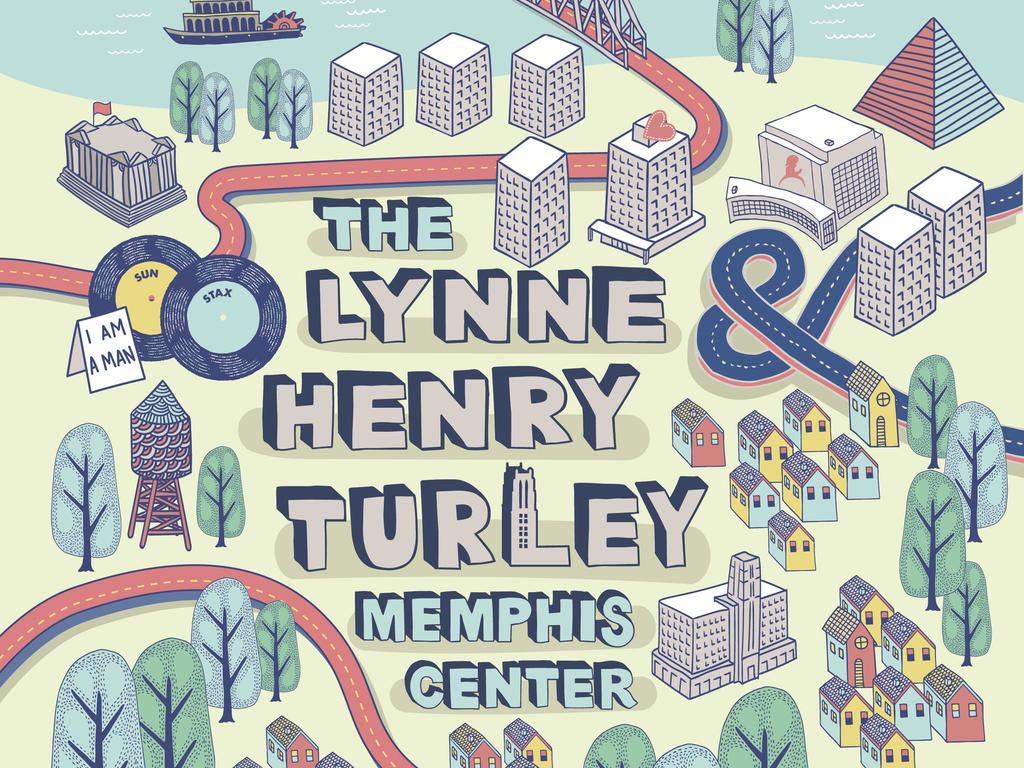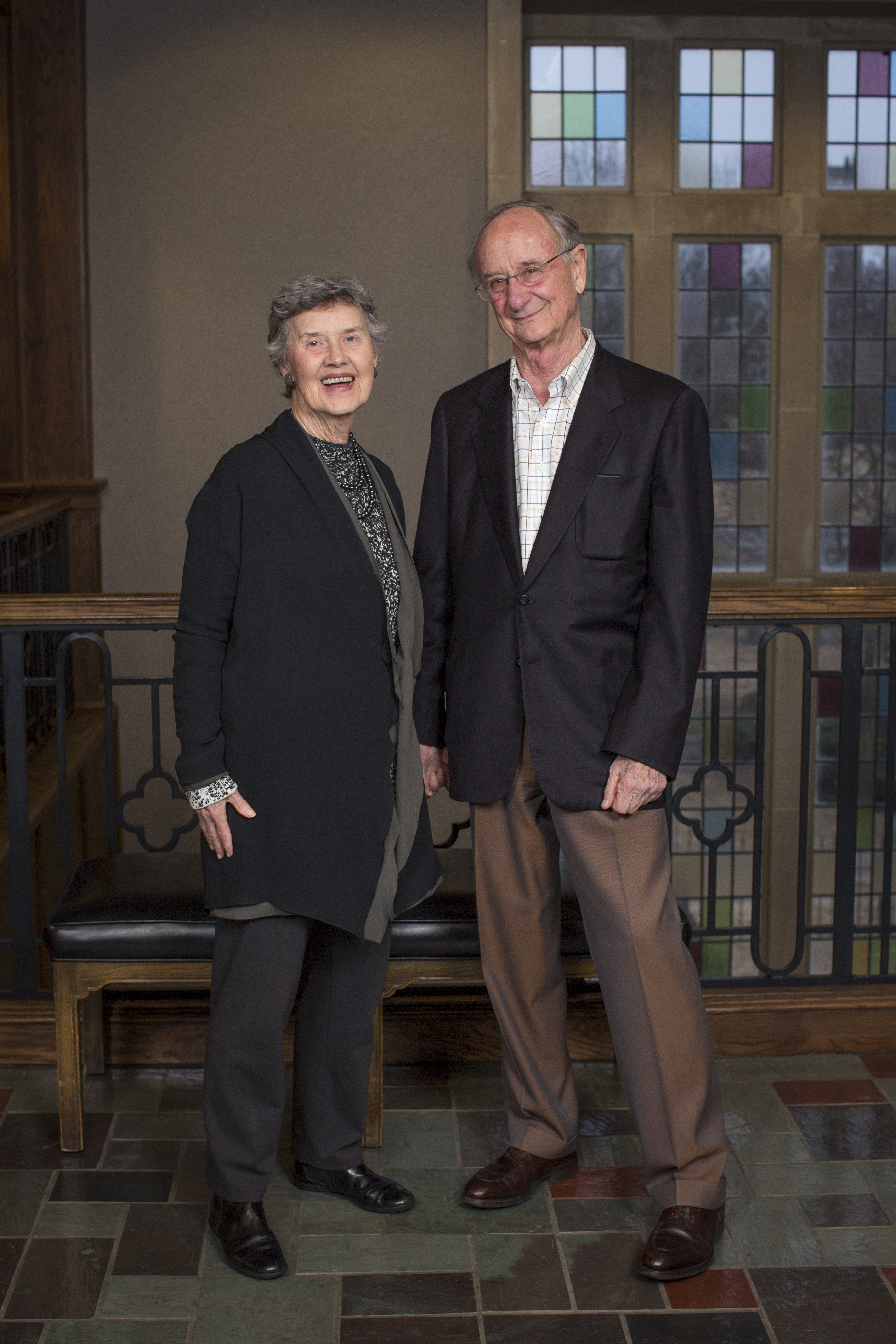
By Gaye Swan
Since the momentous 1925 decision to relocate the school to Memphis, Rhodes has grown into one of the most civic-minded colleges in the country, thanks in large part to the city that has embraced it so whole-heartedly. With each succeeding year, the intertwined communities of city and campus saw the opportunities for mutual benefit grow. Programs such as the Rhodes Learning Corridor, the Rhodes Institute for Regional Studies, and the Mike Curb Institute for Music became an intrinsic part of the Rhodes experience—and in 2012, these and other programs with a Memphis and Mid-South focus were gathered under one dynamic academic umbrella: the Memphis Center.
In her January 2018 inaugural speech, President Marjorie Hass unveiled a significant expansion to this deeply rooted Rhodes program, made possible by the generosity of a deeply rooted Memphis family: Lynne and Henry Turley. Just over a month later, the college celebrated the launch of the newly named Lynne and Henry Turley Memphis Center, and set a course to more than double Rhodes’ investment in community partnerships.
The initial areas of focus for the Turley Memphis Center are urban education, the arts and social change, and neighborhood and community development. Projects to support the vision include a Children’s Rights endeavor to motivate systemic change and promote equity for Memphis youth.Throughout the spring, the Center hosted a series of events that spotlighted the creative arts as a critical element in the fight for liberation and justice, including lectures, performances, and an exhibition of art works. A series of community-based conversations and targeted fellowships are planned to improve students’ understanding of and engagement with Memphis neighborhoods. Finally, the center will actively seek opportunities to bring practitioners, theorists, and lay-people together to identify solutions to social problems, building on work pioneered by Mike Cody ’58 and AC Wharton, the former mayor of Memphis, who both taught classes at Rhodes in the 2017-18 academic year in courses funded by grants awarded through The Andrew W. Mellon Foundation.
"Where the College Meets the City"
At the launch celebration in February, President Hass described the new Turley Memphis Center as the place where the college meets the city. The enlarged academic umbrella provides a way to bring all community engagement efforts under one roof and with one mission. The Center will house all Rhodes core community-facing projects, including Crossroads to Freedom, Urban and Community Health, the Rhodes Archaeological Field School, and the new master’s degree program in Urban Education. The Turleys’ gift will enable the existing connection between city and college to grow deeper, richer, and more impactful.
Turley Memphis Center Director Dr. Charles Hughes says the expansion builds on the broad vision of President Emeritus William E. Troutt and reflects the excitement of the new leadership of President Hass.
“Dr. Hass recognized an amazing opportunity to take the next step with the Memphis Center,” says Hughes. “She was excited about the chance to expand, and the Turleys were ready and supportive, as they always are.”
The expansion will extend to staff, research opportunities, and programming events. An associate director will join the leadership team to oversee ongoing fellowship opportunities and community partnerships, and teach in the classroom. Hughes will be free to increase fellowships, create programming events, and develop community partnerships. A historian with a Ph.D. from the University of Wisconsin-Madison and a published author, Hughes first came to Rhodes as an Andrew W. Mellon Postdoctoral Fellow at the beginning of the Memphis Center project. In addition to his duties as director, he will also teach Memphis-based courses, facilitate other curricular opportunities on campus, and serve as a resource for other faculty members. Plans call for approximately 36 faculty members and 150 students to be involved in some aspect of the Center’s work in the first year.

Increasing Opportunities for Interaction
The projected increase in programming events will contribute to more interaction between Memphis and Rhodes. The presentations – including conferences, lectures, and panels – will stimulate real conversations about the Memphis area, its challenges, and its many strengths. The goal is for participants to share and learn together, Hughes says.
Fittingly, the launch of the Turley Memphis Center was just such an event. In her welcoming remarks, Dr. Hass called the evening an example of the way the Center will invite and inspire the community – and it is just the tip of the iceberg, she added.
Guests first celebrated the new Center and its benefactors at a reception. Respected author, scholar, and educator Jeff Chang of Stanford University then spoke on the role of hip-hop arts, activism, and education in the struggle for social justice in today’s world.
“It was a wonderfully engaging and provocative talk,” says Hughes, and fit in perfectly with the aim of the Turley Memphis Center to involve both communities in meaningful dialogue on important topics.
The event was a way to celebrate the Turleys as well, Hughes adds.
“It was wonderful to see their excitement and joy,” he says. “The Center speaks to all they have appreciated about Rhodes, and to all they have envisioned for Memphis.”
The Lynne and Henry Turley Memphis Center stands as both a testament to the past and a challenge for the future. As President Hass told guests at the celebration, “The opportunity to celebrate the Center is not just a chance to step back and say ‘Isn’t this wonderful, we’ve completed something. It’s really a moment to say, ‘We’re at the starting line, we’re just beginning, we have the wind at our back.’”